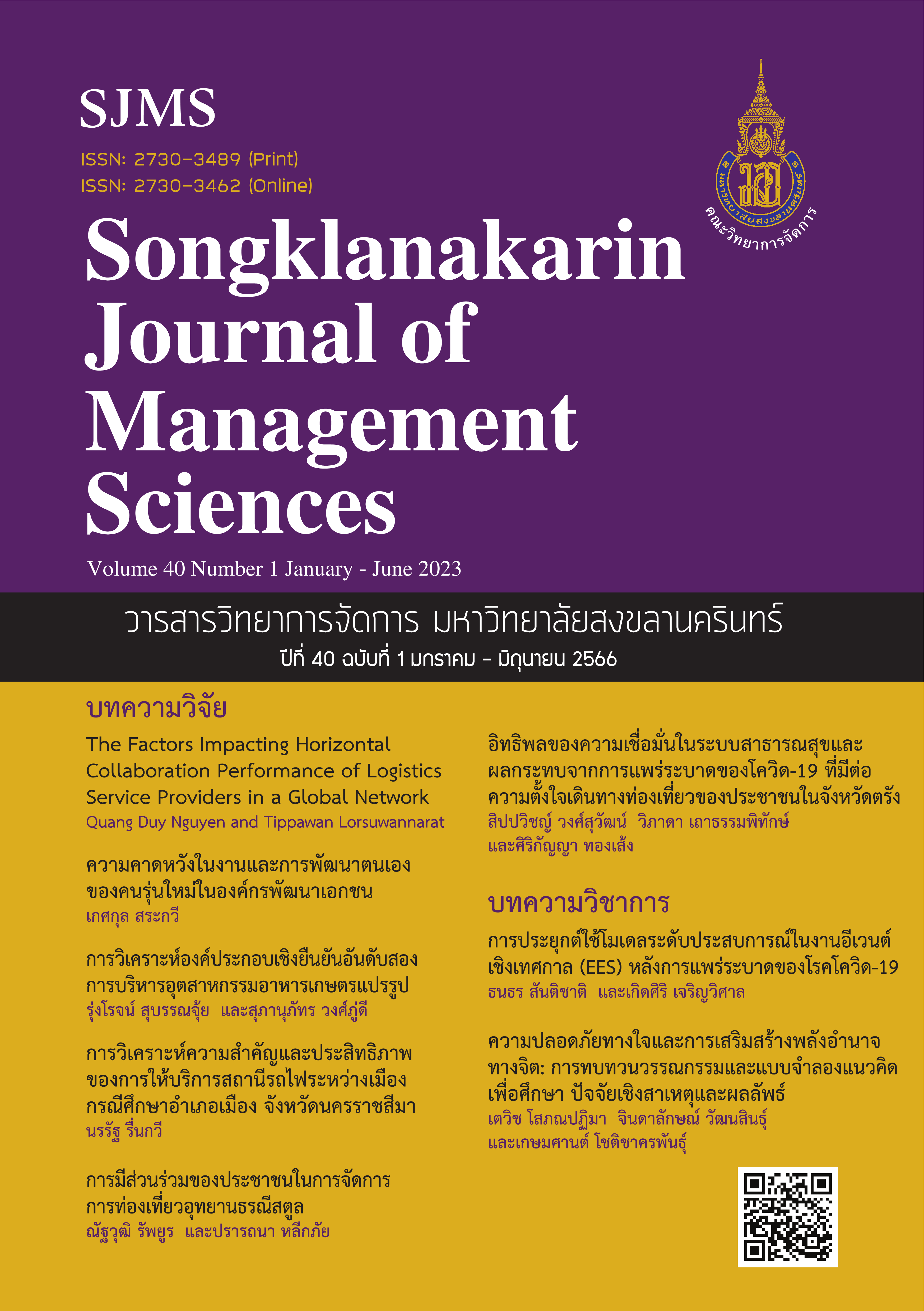The Apply of Event Experience Scale (EES) Model to Festivals After the Pandemic of COVID-19
Main Article Content
Abstract
This article is a study and present of the apply of Event Experience Scale model to festivals after the pandemic of COVID-19. The objective is to study the compositions of the dimensions of experience in events. The 13 data sources are collected from the documents and the academic journals in the past 7 years, and synthesize into 4 components of model of Event Experience Scale appropriate for festival which are; Affective Engagement, Cognitive Engagement, Physical Engagement and Experiencing Novelty. Then, find the relationship with tourists’ satisfaction and behavioral intentions including event safety protective measure of COVID-19 to design the conceptual framework to apply the model for future research about designing experience to tourists in festivals after the pandemic of COVID-19.
Article Details

This work is licensed under a Creative Commons Attribution-NonCommercial-NoDerivatives 4.0 International License.
All published articles are SJMS’s copyright. The editorial board allows all published articles to be copied, excerpted, or disseminated with academic citation.
References
Akhoondnejad, A. (2018). Loyalty formation process of tourists in sporting event: The case of Turkmen horse races. Journal of Hospitality and Tourism Management, 34(1), 48-57.
Baker, B. J., Jordan, J. S., & Funk, D. C. (2018). Run Again Another Day: The Role of Consumer Characteristics and Satisfaction in Repeat Consumption of a Sport-Related Experience Product. Journal of Sport Management, 32(1), 38-52.
Choi, J. (2016). Consumer Impulse Buying of Food at Festivals and Events: Understnading The Role of Sensory Cues (Unpublished doctoral dissertation). Kansas State University.
Coetzee, W. J. L., Lee, C., & Faisal, A. (2019). Predicting Intentions to Revisit and Recommend a Sporting Event Using the Event Experience Scale (EES). Event Management, 23(3), 303-314.
Coetzee, W. J. L., & Pourfakhimi, S. (2019). Affective engagement as a contextual dimension for predicting intentions to revisit and recommend events – a multinational comparison. Journal of Policy Research in Tourism, Leisure and Events, 12(3), 401-421.
De Geus, S., Richards, G., & Toepoel, V. (2016). Conceptualisation and Operationalisation of Event and Festival Experiences: Creation of an Event Experience Scale. Scandinavian Journal of Hospitality and Tourism, 16(3), 274-296.
Hermann, U. P., Lee, C., Coetzee, W. J. L., & Boshoff, L. (2021). Predicting behavioral intentions of Craft Beer Festival attendees by their event experience. International Journal of Wine Business Research, 33(2), 254-274.
Hudson, L. E. (2015). The influence of brand image on Generation Y consumers at electronic dance music festivals by creating a sensory and relational experiential environment linked to global brands (Unpublished master dissertation). Griffith College.
Jaikleaw, K. (2018). Trip Quality and Destination Image Factors Affecting Satisfaction and Behavioral Intention of Thai Tourists Travelling in Thailand (Master’s Thesis). Bangkok University.
Jokhdar, H., Khan, A., Asiri, A., Motair, W., Assiri, A., & Alabdulaali, M. (2021). COVID-19 Mitigation Plans During Hajj 2020: A Success Story of Zero Cases. Health Security, 19(2), 133-139.
Liu, W., Sparks, B., & Coghlan, A. (2017). Event experiences through the lens of attendees. Event Management, 21(4), 463-479.
Ministry of Public Health. (2020). Guidelines of Public Health for Managing The Pandemic of COVID-19 based on Regulations Issued under Section 9 pursuant to the Emergency Decree on Public Administration in Emergency Situations B.E. 2548. https://www.cpa.go.th/cpawebsite/uploads/pdffile/pdf/attachment-20210111-094112.pdf
Ngammak, P. (2020). Guideline for Human Resource Development in MICE Industry. Humanities and Social Sciences Journal, Ubon Ratchathani Rajabhat University, 11(1), 165-177.
Perić, M., Wise, N., Heydari, R., Keshtidar, M., & Mekinc, J. (2021). Getting back to the event: COVID-19, attendance and perceived importance of protective measures. Kinesiology, 53(1), 12-19.
Quadri, S. A., & Padala, P. R. (2021). An Aspect of Kumbh Mela Massive Gathering and COVID-19. Current Tropical Medicine Reports, 8(3), 225-230.
Richards, G. (2017). Experiencias turísticas de festivales y eventos. Terenife: PASOS.
Richards, G. (2020). Measuring the dimensions of event experiences: Applying the Event Experience Scale to cultural events. Journal of Policy Research in Tourism, Leisure and Events, 12(3), 422-436.
Richards, G., King, B., & Yeung, E. (2020). Experiencing culture in attractions, events and tour settings. Tourism Management, 79(1), 1-12.
Rivera, M., Semrad, K., & Croes, R. (2015). The five E’s in festival experience in the context of Gen Y: Evidence from a small island destination. Revista Española de Investigación de Marketing ESIC, 19(2), 95-106.
Rust, E. (2020). Understanding experiential value creation at small-scale events: a multi-stakeholder perspective. Journal of Policy Research in Tourism, Leisure and Events, 12(3), 344-362.
Ryan, B. J., Coppola, D., Williams, J., & Swienton, R. (2020). COVID-19 Contact Tracing Solutions for Mass Gatherings. Disaster Medicine and Public Health Preparedness, 15(3), 1-7.
Shim, J., Moon, J., Song, M., & Lee, W. S. (2021). Antecedents of Purchase Intention at Starbucks in the Context of Covid-19 Pandemic. Sustainability, 13(4), 2-14.
Soonsan, N., & Sukahbot, S. (2020). Causal Relationships between Destination Image, Place Attachment, Overall Satisfaction, and Behavioral Intention of Western Tourists in Phuket. Chulalongkorn Business Review, 42(1), 68-83.
Thailand Convention & Exhibition Bureau. (2019). Creating Memorable Events in Experience Economy Era. MICE Intelligent Center.
Theerapong, K. (2018). A Study of Experience Design for the Development of Cultural Tourism. The Fine & Applied Arts Journal, 13(1), 1-15.
Tubsrisawat, P., & Kittiyapong, J. (2018). Experiences of Customers who Use the Services of Creative Space “Chang Chui”. UTCC Academic Day No.2. University Thai Chamber of Commerce, Bangkok.
Udomthanavong, S. (2019). The Influences of Motivation Affecting To Sport Tourism Achievement at Phuket: A Case Study of Event Marathon. Suthiparithat, 33(106), 236-250.
Widle, A. R. (2015). The Role of Multi-Sensory Marketing at Music Festivals and its Implications in social media (Master’s Thesis). The University of Texas.
World Health Organization. (2020). Key planning recommendations for Mass Gatherings in the context of the current COVID-19 outbreak. https://www.who.int/publications/i/item/
Zhanga, C. X., Fongb, L. H. N., & Li, S. (2019). Co-creation experience and place attachment: Festival evaluation. International Journal of Hospitality Management, 81(1), 193-204.

